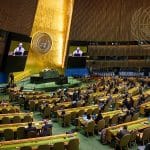While it is an almost painful daily task to ascertain where the Trump administration is positioned on the question of tariff policy, and traders and investors everywhere are paying a heavy price up front, there are a few brave souls who will still argue that long term trends for economic development in the developed world, and especially the United States remain positive.
One such individual is Professor Nouriel Roubini, formerly of New York University but now CEO of Roubini Macro Associates. Once a former White House economist (Clinton administration) and IMF/World Bank staffer, he is more commonly known by the moniker “Dr. Doom,” for having predicted the almost decade-long Eurozone crisis back in 2006-2007, which severely impacted his almost-native Italy (his family immigrated there from Iran). His observations and warnings focused primarily on the need for deep reforms in key Eurozone institutional arrangements.
On April 10, Professor Roubini found himself addressing, in a fireside chat/interview format, a packed auditorium at the tenth annual Delphi Economic Forum meeting. The overall climate was gloomy since President Trump’s “Liberation Day” tariff announcements the week before had sent multiple shockwaves across the global economy, and the Delphi Economic Forum is nothing if not a gathering point for globalization proponents.
Since much of Roubini’s earlier doomsaying had a direct bearing on Greece and its extreme structural adjustment difficulties while fighting to hang onto the Euro in the crisis years after 2010, he went out of his way at the start to explain that some in the audience might be calling him “Dr. Boom” at the end of his presentation.
Roubini’s key points:
—First order of the day was to address President Trump’s surprise announcement the day before of a 90-day suspension of the introduction most of his so-called “reciprocal tariffs,” but not including the baseline ten percent tax. Roubini opined that the so-called “bond vigilantes” rattled the markets and Treasury Secretary Scott Bessent deeply, forcing Trump to step back especially as neither Federal Reserve Bank Chair Jerome Powell nor Chinese leader Xi Jinping had backed down from their stated positions in an extended game of “chicken.” Roubini also noted that Congress was beginning to make threats about limiting the President’s trade negotiation authority, something Trump had not expected.
—On tariffs Roubini said there will be plenty of compromises in trade talks, but he expected Trump’s ten percent baseline rate would hold, which he said was sustainable if not unpleasant. At that tariff level a recession could well be avoided, he argued, but Trump needed the income flowing from the ten percent baseline tariffs to finance the expiring federal tax cuts he intended to make permanent. Roubini’s prediction was that the China tariff battle would continue for some time, even with a major focus on de-risking that situation, while trade deals with allies will lower most of the recent trade tensions.
—While the China trade dispute will continue, Roubini explained that China will have to take major steps to restructure its economy. He said the country simply cannot continue to dump its excess production in the West or even in the “Global South.”
—Roubini was positive regarding some Trump administration economic policy steps. Removal of restrictions on energy production were needed to lower energy costs. He also said the ultimate objectives — although not the tactics — of the Elon Musk-run Department of Government Efficiency (DOGE), were also acceptable as fiscal consolidation was a vitally important target for Washington.
—The potential for exponential growth in the United States thanks to investments in Artificial Intelligence (AI) means the country is on the verge of a technological revolution, Roubini argued. As long as investment continues in this sector, “Mickey Mouse could run the U.S. economy” he stated.
—Roubini predicts an AI-driven U.S. productivity boom, despite the ongoing tariff battles. He asserted that thanks to AI, so-called “American Exceptionalism” underpinning much of the country’s strong economic growth and innovation will continue.
—Reminding the audience that “Tech trumps Tariffs” Roubini argued that strong tech-driven U.S. growth will continue, outstripping Europe and even China, eventually helping to bring the U.S. debt issue into more manageable bounds, assuming fiscal consolidation continues. In this context a decline in the value of the U.S. dollar is not a long-term problem, “Dr. Boom” concluded.








